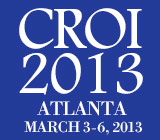 Merck’s investigatory non-nucleoside reverse transcriptase inhibitor (NNRTI) MK-1439 proved safe and well tolerated—and it displayed robust antiviral activity in a small early trial, aidsmap reports. Representatives from Merck announced findings from a Phase Ib safety and efficacy trial of the non-nuke at the 20th Conference on Retroviruses and Opportunistic Infections (CROI) in Atlanta. The double-blind, placebo-controlled study of 18 treatment-naive patients with HIV divided them into three even groups: The first took 25 milligrams of MK-1439; the second 200 mg of the drug; and the third a placebo. All participants took one dose per day as a monotherapy for seven days.
Merck’s investigatory non-nucleoside reverse transcriptase inhibitor (NNRTI) MK-1439 proved safe and well tolerated—and it displayed robust antiviral activity in a small early trial, aidsmap reports. Representatives from Merck announced findings from a Phase Ib safety and efficacy trial of the non-nuke at the 20th Conference on Retroviruses and Opportunistic Infections (CROI) in Atlanta. The double-blind, placebo-controlled study of 18 treatment-naive patients with HIV divided them into three even groups: The first took 25 milligrams of MK-1439; the second 200 mg of the drug; and the third a placebo. All participants took one dose per day as a monotherapy for seven days.
Three-quarters of participants experienced limited, transient and generally mild to moderate adverse experiences in the study. On the seventh day of the study, those taking 25 mg of MK-1439 saw a mean drop of 1.37log10 in viral load compared with the placebo group, and those taking 200 mg of the drug saw a 1.26log10 drop. No one in the two groups showed evidence of viral breakthrough.
Meanwhile, a second study of MK-1439 to determine its safety and pharmacokinetics (PK) among HIV-negative subjects determined that the drug is suitable for once-a-day dosing and is generally well tolerated. One out of the 72 males in the study experienced elevated liver enzymes, apparently because of muscle damage from heavy physical activity—a reaction the medication may have aggravated. There were no reports of rashes or significant central nervous system adverse reactions outside of headache.
To read the aidsmap story, click here.
To read the study abstract, click here.
Advertisement
Advertisement
Advertisement






Comments
Comments